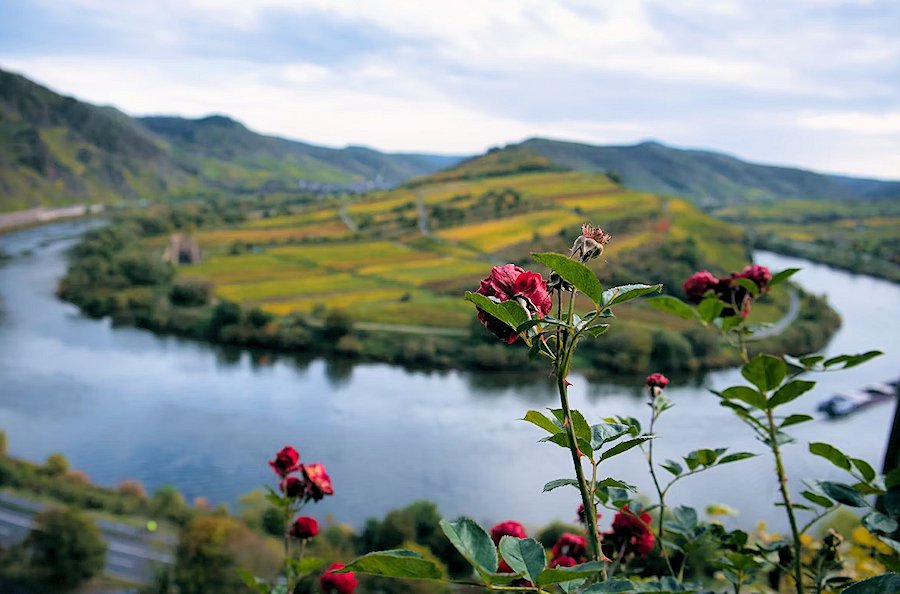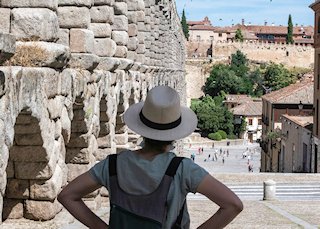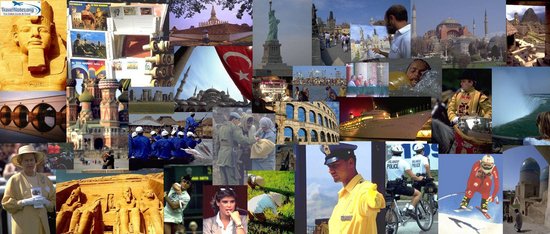Travel Notes: Destinations: Europe: Germany - Moselle Travel Guide > Moselle River Cruises.
Short URL: https://tnot.es/Moselle
Travel Guide For Visitors to Moselle
Fancy a real escape without fighting through crowds of selfie-stick wielding tourists? The Moselle Valley, in Germany, might just be the secret you need to know. Share on Facebook
Picture This
Impossibly steep vineyards tumbling down to a meandering river, medieval castles perched on hilltops like something from a fairy tale, and wine so good it'll make you question everything you thought you knew about German vintages.
 Add a Business -
Add a Location -
Add a Lodging - Add Travel Content
- Add URL
- Travel Services.
Add a Business -
Add a Location -
Add a Lodging - Add Travel Content
- Add URL
- Travel Services.
Visiting The Moselle Valley - Before it Gets Busy
Welcome to the Moselle Valley, where the Rhine's quieter cousin serves up drama, history, and some seriously impressive Rieslings.
Why the Moselle Valley Deserves Your Attention
Let's be honest, when most people think of German wine regions, they either draw a blank or mumble something about sweet white wine from the 1980s.
But the Moselle Valley is having its moment, and savvy travellers are cottoning on fast.
This serpentine river valley, stretching from the French border near Trier to its confluence with the Rhine at Koblenz, offers everything you'd want from a European wine region; minus the eye-watering prices and pretentious sommeliers.
The Romans were onto something when they planted the first vines here 2,000 years ago, and frankly, they had excellent taste.
Getting Your Bearings - Moselle Valley Geography Made Simple
The Moselle Valley runs roughly 195 kilometres through western Germany, carving its way through the states of Rhineland-Palatinate and Saarland.
The river itself actually starts in France (where it's called the Moselle), pops through Luxembourg, then settles into Germany for the scenic stretch that will have you reaching for your camera, or phone, every five minutes.
Towns to Watch Out For
Bernkastel-Kues - Picture-perfect medieval town.
Cochem - Fairy-tale castle territory.
Koblenz - Where the Moselle meets the Rhine.
Traben-Trarbach - Art Nouveau architecture meets wine culture.
Trier - Ancient Roman capital and gateway to the region.
Best Time to Visit the Moselle Valley
Spring (April-May)
The vineyards are waking up, temperatures are pleasant, and you'll dodge the summer crowds.
Perfect for hiking and cycling.
Summer (June-August)
Peak season brings warm weather, long days, and bustling wine festivals.
Book accommodation well in advance.
Autumn (September-October)
Harvest season is absolutely magical.
The vineyards turn golden, the weather's still mild, and there's a palpable excitement in the air as winemakers bring in their grapes.
Winter (November-March)
Many tourist facilities close, but it's atmospheric and peaceful.
Christmas markets add festive charm.
Getting There and Getting Around
By Air
The nearest major airports are Frankfurt-am-Main (FRA) (about 45 minutes from the valley), Cologne/Bonn (CGN), and Luxembourg (LUX).
Frankfurt Airport is popular with budget airlines, though the transfer can be a bit of a faff.
By Car
Renting a car gives you the freedom to explore hidden villages and stop at small wineries; but be warned, the valley roads can be narrow and winding.
German drivers are generally well-behaved, but keep your wits about you.
By Train
Germany's efficient rail network makes the Moselle easily accessible.
Koblenz and Trier are the main railway hubs, with regular connections to major German cities.
The journey from Cologne to Koblenz takes about 90 minutes.
River Cruises
Moselle river cruises are hugely popular, offering a relaxed way to see the valley's highlights.
Day trips and multi-day cruises are available from various operators.
Must-See Destinations in the Moselle Valley
Bernkastel-Kues - Medieval Charm by the Glassful
This impossibly picturesque town is what happens when medieval architecture meets world-class wine.
The market square looks like a film set, complete with half-timbered houses and narrow cobbled streets.
Local Highlights
Bernkastel Castle ruins - Steep climb, spectacular views.
Cusanus wine estate - Historic winery with exceptional Rieslings.
Wine tastings - The town is surrounded by some of Germany's finest vineyards.
Cochem - Fairy-Tale Castle Central
Cochem's Reichsburg castle, perched dramatically above the town, is every bit as impressive as it looks in the tourist brochures.
The town itself is a delightful mix of wine bars, restaurants, and traditional German charm.
Worth Your Time
Chairlift to Pinnerkreuz - Panoramic valley views.
Historic mustard mill - Quirky local attraction.
Reichsburg Castle - Guided tours available.
Traben-Trarbach - Art Nouveau Meets Wine Innovation
This twin town showcases stunning Art Nouveau architecture alongside innovative winemaking.
It's less touristy than some neighbours but equally rewarding.
Unique Experiences
Buddha Museum - Unexpected cultural gem.
Mosel-Vinothek - Excellent wine shop and tasting room.
Underground wine cellars* - Fascinating tunnel network.
Trier - Where Roman History Meets Modern Wine Culture
Germany's oldest city doesn't mess about when it comes to historical credentials.
The Porta Nigra (Black Gate) is an absolute stunner; a massive Roman city gate that's survived nearly 2,000 years of wars, weather, and German efficiency.
Don't Miss
Amphitheatre - Where gladiators once fought.
Imperial Roman Baths - Impressive ruins of ancient luxury.
Karl Marx House - Yes, that Karl Marx was born here.
Trier Cathedral - Stunning Romanesque architecture.
Wine Experiences - Beyond the Basic Vineyard Tour
The wine-growing region along the Moselle, Saar and Ruwer rivers is considered Germany's oldest wine region.
Top Wine Experiences
Harvest Participation
Some estates welcome visitors to help with harvest (usually late September to October).
It's hard work but incredibly rewarding.
Private Vineyard Tours
Many family-run estates offer intimate tastings with the winemaker.
These personal experiences often include vineyard walks and detailed explanations of the wine-making process.
Wine Hiking Trails
The region offers marked trails through vineyards, combining exercise with education.
The Moselsteig long-distance trail is particularly spectacular.
Understanding Moselle Wines
The Moselle's steep, slate-rich slopes produce some of the world's finest Rieslings.
The slate retains heat during the day and releases it at night, creating perfect conditions for slow grape ripening.
The result is wines with incredible complexity, bright acidity, and distinctive mineral notes.
Wine Styles to Try
Auslese - Premium late-harvest wines.
Eiswein - Rare ice wine (if you're lucky).
Kabinett - Light, delicate, often slightly sweet.
Spätlese - Richer, more concentrated.
Moselle Accommodation - From Boutique Hotels to Wine Estate Stays
Budget-Friendly Stays
Jugendherberge Cochem (Klottener Str. 9).
Well-maintained hostel with stunning castle views.
Wineries
Simple but clean budget accommodation may be found at a number of working wineries in the region.
Luxury Options
Hotel Villa Hügel (Bernhardstraße 14, Trier).
Boutique hotel with modern amenities and a focus on local culture.
Schloss Lieser (Moselstrasse 33, Lieser).
A fairy-tale castle converted into a luxury hotel.
The rooms are individually decorated, and the restaurant serves creative cuisine.
Mid-Range Choices
Hotel Haus Lipmann (Marktplatz 3, 56814 Beilstein).
Family-run hotel with comfortable rooms and breakfast.
Moselromantik Hotel Dampfmühle (Am Steffensberg 80, Enkirch an der Mosel).
Located at the edge of the village and forest of the beautiful and historical wine-growing village of Enkirch.
Tourist Map of Trier
Use the Tourist Map of Trier to help you decide where to stay in Trier based on travel budget, preferred location, planned must-see attractions and local must-do activities.
Food and Drink - Beyond the Obvious
Restaurant Recommendations
Alte Thorschenke (Brückenstraße 3, Cochem).
Traditional German cuisine in a historic setting.
The schnitzel is legendary.
Weinstube Kesselstatt (Liebfrauenstraße 10, Trier).
Atmospheric wine bar serving local specialities.
The wine selection focuses on small producers.
Zeltinger Hof (Kurfürstenstraße 76, Zeltingen-Rachtig).
Hotel and adventurous dining with creative takes on regional cuisine.
The wine list is predictably exceptional.
Traditional Moselle Cuisine
The region's food reflects its position between Germany, France, and Luxembourg. Expect hearty dishes that pair beautifully with local wines.
Must-try Dishes
Himmel un Ääd - Mashed potatoes with apples and black pudding.
Reibekuchen - Crispy potato pancakes.
Sauerbraten - Marinated roast beef, often served with red cabbage.
Wild boar (Wild Schwein) - Popular during hunting season.
Outdoor Adventures and Activities - Active Mosel Holidays
Cycling the Moselle Cycle Path
The flat, well-maintained cycle path runs alongside the river for most of its length.
It's perfect for families and casual cyclists, with plenty of stops for refreshments.
Practical Tips
Bike rental is available in most towns.
Many accommodations are cyclist-friendly.
Regular train connections allow one-way cycling.
Hiking the Moselsteig Trail
This 365-kilometre trail follows the river from Perl to Koblenz, passing through vineyards, forests, and historic towns.
You don't need to tackle the whole thing; day sections offer plenty of variety.
Top Day Hikes
Bernkastel to Graach - Classic vineyard scenery.
Cochem circular trail - Castle views and river vistas.
Traben-Trarbach to Enkirch - Art Nouveau architecture to medieval charm.
River Activities
Canoeing and Kayaking
The gentle current makes the Moselle ideal for paddling.
Several operators offer rentals and guided tours.
Swimming
While not Mediterranean warm, the river offers pleasant swimming spots during summer months.
Hidden Gems and Local Secrets
Bremm's Calmont Vineyard
Home to Europe's steepest vineyard (65-degree slope), this small village offers spectacular views and exceptional wines.
The climb to the top is challenging but rewarding.
Kloster Machern
This former monastery near Bernkastel-Kues now houses a small winery producing exceptional wines in limited quantities.
Ürzig's Red Slate Vineyards
While most Moselle vineyards feature blue slate, Ürzig's red slate soils produce distinctly different wines.
The Würzgarten vineyard is particularly notable.
Practical Tips for Moselle Valley Travel
Currency
Germany uses the Euro.
Credit cards are widely accepted, but carry some cash for small establishments and wine tastings.
Driving Considerations
The legal blood alcohol limit is 0.05%, but many visitors opt for designated drivers or public transport during wine tastings.
Language
Most locals speak some English, especially in tourist areas.
However, a few German phrases will earn you smiles and potentially better service.
Opening Hours
Many businesses close on Sundays and Monday mornings.
Wine estates often require appointments, especially for tastings.
Tipping
Round up restaurant bills or add 10% for good service.
Tipping isn't mandatory but is appreciated.
Making the Most of Your Moselle Valley Adventure
The Moselle Valley rewards travellers who embrace its gentle pace and wine-focused culture.
Don't try to tick off every sight, instead, choose a base town and explore thoroughly.
Book wine tastings in advance, especially during harvest season.
Most importantly, allow time for spontaneous discoveries; the valley's magic often lies in unexpected moments.
Whether you're a wine enthusiast, history buff, or simply seeking a peaceful escape from urban chaos, the Moselle Valley delivers authenticity without pretension.
It's a reminder that some of Europe's finest experiences still exist beyond the well-trodden tourist trails.
Ready to Explore Germany's Wine Country?
The Moselle Valley is waiting; just don't tell everyone about it quite yet.
More City Travel Guides
Cities in Africa - Cities in America - Cities in Asia - Cities in Australasia - Cities in Latin America - European Destinations - Middle East.
More From Travel Notes
Travel Notes Online Guide to Travel
Africa - Asia - Caribbean - Europe - Middle East - North America - Oceania - South America.
The Travel Notes Online Guide to Travel helps visitors plan their trip with country and city travel guides, local tourist information, reviewed web sites, and inspiring travel content.
Travel and Tourism Guides on Travel Notes
 If you find Travel Notes useful, please take a moment to
like us on Facebook and share with your friends on social media.
If you find Travel Notes useful, please take a moment to
like us on Facebook and share with your friends on social media.
Share on Facebook
Travel Resources
.
Travel & Tourism With Industry Professionals.














